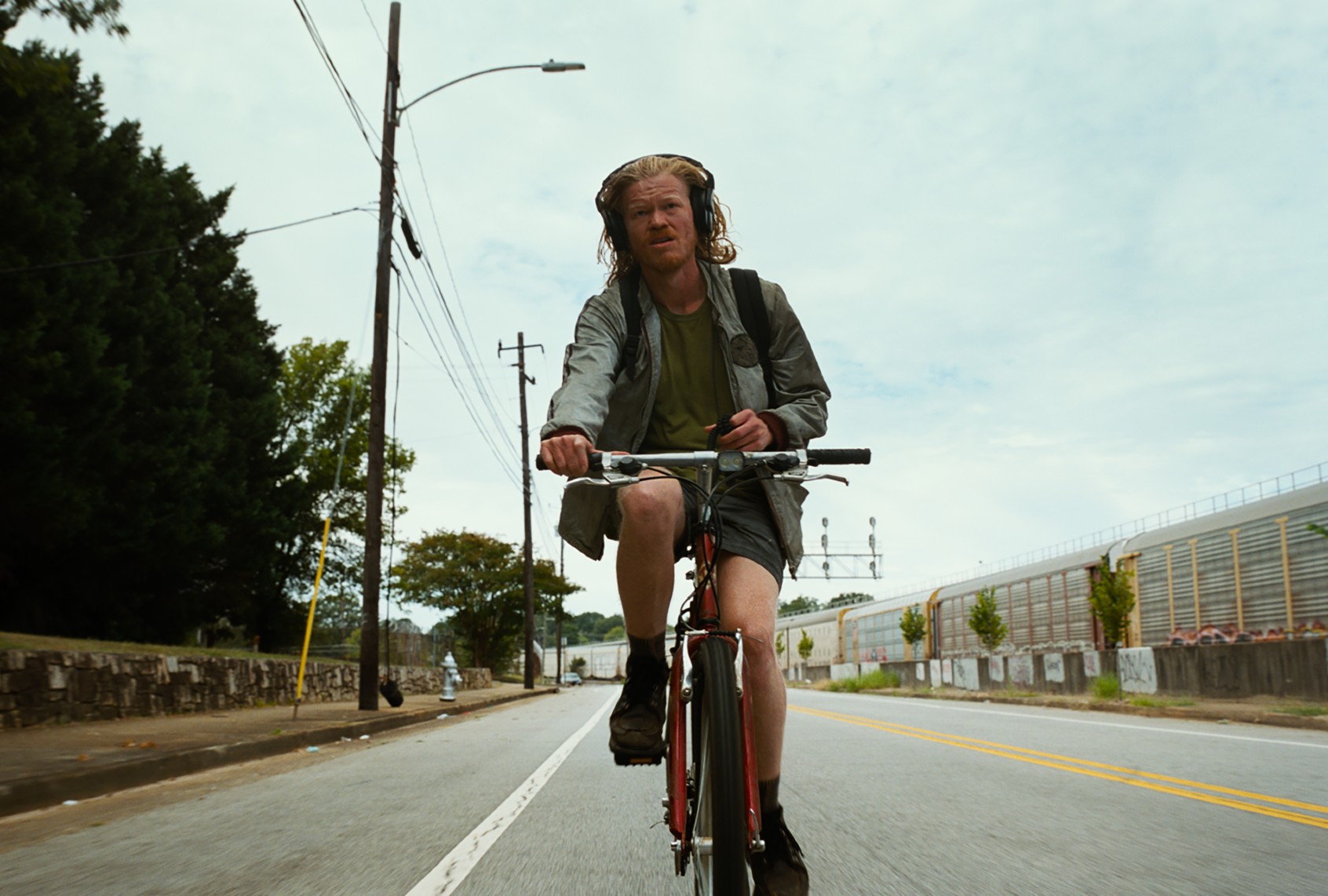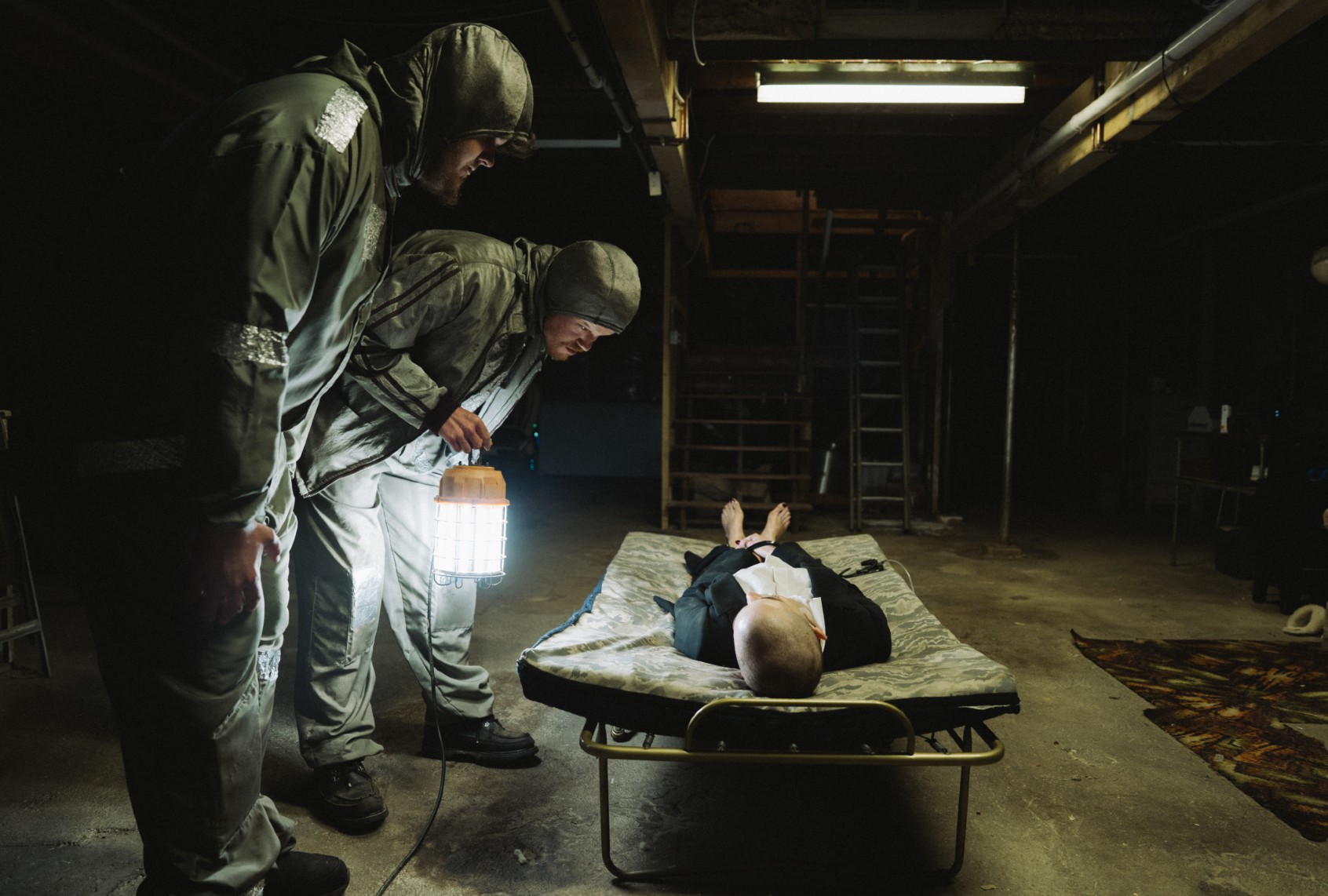Being a CEO these days is tough. On one hand, the economy isn’t great, and every choice you make is an opportunity to be scrutinized by those darn online activists, not to mention the board of investors! On the other hand, you also run the risk of having your life cut short by violent means if you don’t at least try to placate both parties. What’s a rich, successful, beautiful, intelligent businesswoman to do?
If you’re Michelle Fuller (Emma Stone), the CEO of the fictional pharmaceutical company Auxolith in Yorgos Lanthimos’ latest film, “Bugonia,” you dedicate a little time each day to appeasing everybody. Let all employees leave at 5:30 p.m. every day — well, as long as they don’t make it a habit. Invest in revolutionary products and experiments that will keep outside skeptics and inside financiers happy with the way the company operates. And, just in case a few of those pesky radicals slip through the cracks, train in Krav Maga and keep a strict diet and exercise regimen to maintain optimal mental and physical acuity. Surely, all of this will be enough to keep the company running smoothly and keep the critics at bay.
Lanthimos and screenwriter Will Tracy cleverly consider the realistic aftermath of public acts of violence, asserting that we must first relearn how to listen to one another for real change to occur. Militancy’s intense volume is futile when it falls on deaf ears.
That is, until one day, when Michelle finds herself seated around a dinner table, strapped to a chair that’s been bolted to the floor. Sitting across from her is Teddy Gatz (Jesse Plemons), an Auxolith warehouse worker and mastermind of the hostage situation she’s found herself at the center of, who is about to casually drop a nuclear truth bomb. “99% of activism is just exhibitionism and brand maintenance in disguise,” Teddy says, lifting a forkful of spaghetti to his mouth to punctuate his thoughts. Michelle bristles; those certainly don’t seem like hard numbers, but who is she to argue with this specific point? She’s the one tied to a chair, after all. Best not to get her fur up until she needs to.
(Atsushi Nishijima/Focus Features) Emma Stone as Michelle in “Bugonia”
If this situation seems a bit convoluted, that’s the point. Seeing two people, completely adverse in power and belief systems, sitting across from one another and having a conversation — albeit with one of them restrained — is the rarity that gives this dark comedy its humorous edge. Recent history alone has shown us that, when the common person gets into the ring with their chosen social or political adversary, brutality prevails over dialogue. Violence, enacted as retaliation for the cruelty dealt by the hands of the rich and powerful, momentarily levels the playing field. But as far from reality as “Bugonia” sometimes gets, Lanthimos and screenwriter Will Tracy cleverly consider the realistic aftermath of these public acts of violence, asserting that we must first relearn how to listen to one another for real change to occur. In this nerve-racking thriller that so often mirrors our real world, militancy’s intense volume is futile when it falls on deaf ears.
Despite being bigger, bolder and more shocking than the average form of activism, we’ve watched as extremists momentarily capture the world’s attention, before the general narrative inevitably sways a different way. Most notably, Charlie Kirk’s very public assassination earlier this fall has, so far, done little more than propagate the beliefs Kirk was already spouting. Though the right has spun it as a form of grief and remembrance, conservatives have been all too happy to make Kirk their martyr, positioning him as the tragic figure whose harmless beliefs brought about his untimely demise. (That spin, of course, dismisses the inherent violence in Kirk’s messaging, but I digress.)
In the case of Luigi Mangione, on the other hand, things are less cut and dry. Mangione’s alleged killing of UnitedHealthcare CEO Brian Thompson seemed to briefly unify a broken country last December. In the days and weeks following Thompson’s murder, it appeared as though people were finally having legitimate conversations about the bleak state of American healthcare. News organizations, social media users on both sides of the political divide and even grumbling relatives at holiday gatherings could admit that the for-profit healthcare industry was deeply problematic and predatory. For a short time, it seemed that Mangione’s alleged act of extremist violence could actually have some real-life implications, possibly even make visible change.
Start your day with essential news from Salon.Sign up for our free morning newsletter, Crash Course.
Then, as the story goes, Mangione’s photos were released, and the narrative shifted away from the motivation behind Thompson’s killing and toward his purported assassin’s appearance. Mangione was no longer just a folk hero; he was a sex symbol, and it didn’t take long for his looks to become the prevailing discussion. Undoubtedly, this Halloween will be filled with Mangione costumes. What a coincidence that “Bugonia” expands nationwide the same day, just in time to remind viewers of how easily radicalism can be made frivolous by those unwilling to take it seriously.
If these rebellious attempts at waking the world up are no more effective than marching in the street, how can the everyday person hope to make legitimate change in a time that already feels so helpless? As “Bugonia” suggests, the key is balance. We must be loud, but we must also listen.

(Focus Features) Jesse Plemons as Teddy in “Bugonia”
Everyone’s talking, but no one’s quite hearing anyone. And all of this neglect engenders heartache as much as it does violence, creating a cyclical link between the two that “Bugonia” sits firmly in the center of.
After Teddy and his cousin, Don (Aidan Delbis), kidnap Michelle in broad daylight, a mutual dialogue is all the CEO wants to have. But the men are entirely uninterested in negotiating with extraterrestrials. Teddy and Don believe Michelle to be an alien from the Andromeda galaxy, sent to Earth to poison its people and destroy the planet. Tracy’s script, a faithful yet singular remake of the 2003 South Korean film, “Save the Green Planet!,” shrewdly analyzes how quickly contemporary hopelessness breeds radicalism. Though they’re written through a conspiratorial lens, Teddy’s exhaustion and paranoia feel grounded in reality. Even restrained in his basement, Michelle understands how he came to this point. For a high-powered pharma chief, she’s remarkably in tune with how the average person feels, which is what angers Teddy so much when Michelle continuously asks for an honest conversation. He hasn’t prepared for a back-and-forth, only enough verbal waterboarding to exhaust Michelle and convince her to arrange a meeting with the Andromedon leaders. Even with the cause of his perceived problems willing to do just about anything to be released, meaning that tangible change is in the palm of his hand, Teddy can only think of his own agenda.
But Lanthimos and Tracy want to go deeper, to examine not just the kinds of figures that have found their way into the headlines by violent means, but what drives this undercurrent of exhaustion that propels their extremism. Every character in “Bugonia” is deeply lost; predator and prey, circling each other as a constant reminder that there is no escape in this pointless game. When Teddy makes some headway in his life — that is, his plans for Earth’s future by way of aliennapping — his childhood babysitter, Casey (Stavros Halkias), now a local police officer, returns to darken his door. External forces seem to always keep progress just out of reach, and danger only grows closer because no one is willing to admit just how deeply screwed they all are. Everyone’s talking, but no one’s quite hearing anyone. And all of this neglect engenders heartache as much as it does violence, creating a cyclical link between the two that “Bugonia” sits firmly in the center of.

(Atsushi Nishijima/Focus Features) (L to R) Aidan Delbis as Don, Jesse Plemons as Teddy and Emma Stone as Michelle in “Bugonia”
Aided by Stone and Plemons’ wily pair of performances, “Bugonia” is both everything you think it will be and nothing like that image at all. It is grim, sure, but Tracy’s sharp humor and Lanthimos’ snappy pacing and typically sumptuous style lend an amiable quality to such a dismal story. There is a calculated approachability to the film, an almost goofy entry point that hooks viewers before stuffing them into a bag and whipping them around for two hours, spitting them back out into a world where everything and nothing is the same.
Throughout, Lanthimos asks his audience to consider if there is anything left to do, or if anything can be done at all. How far would you go to save the world? If one feels their species is threatened, surely they can’t sit idly by. But, if protesting is just fruitless exhibitionism, as Teddy claims, and radical acts of direct action don’t seem to work any better, what is there to do if no one will listen? Perhaps this nihilism will prove too trenchant and reactive for some viewers. That’s perfectly fine: Sometimes it feels good to scream for help, even if it will never come. But others will be moved to stop for a moment and let the hum of everyday chaos quiet, finding a bit more clarity in the silence — maybe even a chance to hear something they haven’t before.
Read more
about films dissecting everyday fears



























